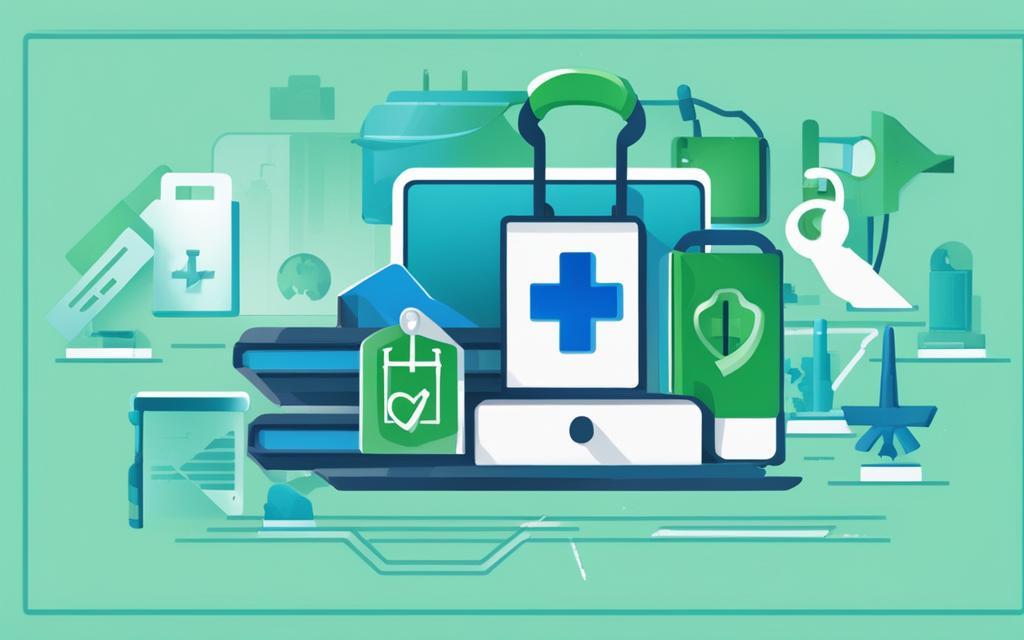The Importance of Data Recovery in Healthcare
In today’s digital age, healthcare organizations heavily rely on technology to provide efficient and quality care to patients. Patient information is crucial for delivering personalized treatments and maintaining accurate medical records. However, the increasing volume of data and the growing threats of cyberattacks and natural disasters make data backup and recovery essential for uninterrupted medical services.
Data loss or corruption can occur due to various reasons, including cyberattacks, human errors, and natural disasters. These incidents can compromise patient care, cause financial loss, and damage the reputation of healthcare organizations. Implementing robust data backup and disaster recovery strategies is necessary to protect patient information and ensure uninterrupted medical services.
In the United Kingdom, healthcare organizations face an ever-increasing need to safeguard patient data. The healthcare data recovery process involves the creation and storage of copies of data in secure locations to protect against data loss or corruption. This process not only enhances cybersecurity but also minimizes downtimes in healthcare facilities.
Efficient data backup and recovery techniques enable healthcare organizations to retrieve lost data before hackers can exploit it, reducing the risk of data breaches. By minimizing downtimes, healthcare professionals can continue to provide uninterrupted medical services, ensuring the well-being of their patients.
Furthermore, implementing robust data backup and recovery strategies can help healthcare organizations reduce costs. By eliminating the need to hire expensive external data recovery services, healthcare organizations can allocate their resources more efficiently, ultimately benefiting both patients and the organization.
In conclusion, data recovery plays a vital role in safeguarding patient information and ensuring uninterrupted medical services in the UK. Healthcare organizations must prioritize data backup and recovery to protect patient data, maintain operational continuity, and uphold their commitment to delivering quality healthcare services.
Risks in Healthcare Data Security
Healthcare organizations face various risks that can result in data loss or corruption. These risks encompass cyberattacks, human errors, and natural disasters, all of which pose significant threats to the security and integrity of healthcare data.
Cyberattacks are a primary concern, with malicious actors employing various techniques to target healthcare systems and gain unauthorized access to sensitive patient information. Ransomware attacks, for instance, have become increasingly prevalent, encrypting critical data and demanding substantial payments for its release.
Human errors also contribute to data loss in healthcare organizations. Accidental deletion of data, misconfiguration of systems, or mishandling of electronic devices can lead to irreversible data loss and compromise patient care. Human errors are often unintentional but can have severe consequences for data security.
Natural disasters, such as hurricanes and floods, pose another risk to healthcare data security. These events can cause significant damage to healthcare facilities and their IT infrastructure, resulting in the loss of critical patient information. Without proper data backup and recovery measures, healthcare organizations may struggle to recover data after a natural disaster.
“The cybersecurity threat landscape in healthcare is constantly evolving, requiring organizations to be proactive in protecting patient data. Cyberattacks, human errors, and natural disasters all present unique challenges that must be addressed through robust security measures and disaster recovery strategies.” – Dr. Sarah Johnson, Cybersecurity Expert
Data Backup and Disaster Recovery Strategies
In the healthcare industry, data backup and disaster recovery are crucial for protecting against data loss or corruption. Healthcare organizations handle sensitive patient information and rely heavily on technology for uninterrupted medical services. To ensure the safety and availability of this data, implementing effective backup and recovery strategies is essential.
One best practice in data backup is the 3-2-1-1-0 rule. This rule states that organizations should keep three copies of their data, including the production data and two backup copies. These backup copies should be stored on different media, such as disk and tape or disk and cloud. Additionally, one of the backup copies should be stored offsite to protect against on-site disasters.
Healthcare organizations have various options for backup solutions, including on-premises and cloud-based solutions. Each option has its own benefits and considerations, so organizations need to evaluate their specific needs and requirements to determine the most suitable approach.
“Data backup and disaster recovery are vital aspects of ensuring the continuity of healthcare services and safeguarding patient information from potential threats.”
The 3-2-1-1-0 Rule in Data Backup
The 3-2-1-1-0 rule provides a comprehensive approach to data backup, ensuring redundancy and protection against various risks. It helps organizations maintain multiple copies of their data, reducing the chances of permanent data loss in case of a disaster or system failure. By adhering to this rule, healthcare organizations can significantly enhance their data resilience and recovery capabilities.
Backup Options for Healthcare Organizations
Healthcare organizations can choose between on-premises and cloud-based backup solutions. On-premises backup involves storing data on local servers or storage devices within the organization’s premises. This option provides direct control over data and may be suitable for organizations that have strict compliance requirements or prefer to maintain physical control over their infrastructure.
Cloud-based backup, on the other hand, involves storing data on remote servers managed by a third-party provider. This option offers scalability, flexibility, and additional security measures, such as encryption and multiple data centers. Cloud-based backup solutions can be more cost-effective and ensure data accessibility from anywhere, making it a popular choice for many healthcare organizations.
Here is a comparison between on-premises and cloud-based backup solutions:
| On-Premises Backup | Cloud-Based Backup | |
|---|---|---|
| Control Over Data | Full control | Third-party management |
| Scalability | Hardware limitations | Flexible and scalable |
| Cost | Upfront investment | Pay-as-you-go model |
| Security | Physical control | Additional encryption and security measures |
| Accessibility | Dependent on physical location | Accessible from anywhere with an internet connection |
Note: The table above provides a high-level comparison of key factors to consider when choosing a backup solution. Organizations should conduct a thorough evaluation considering their specific requirements.
Regardless of the chosen backup solution, healthcare organizations must regularly test their backup processes and recovery plans to ensure their effectiveness. Regular testing helps identify any potential issues or gaps in the backup strategy, allowing organizations to address them proactively.
Implementing a robust data backup and disaster recovery strategy is crucial for healthcare organizations. It protects against data loss, ensures continuous access to critical information, and maintains the trust and confidence of patients. By following best practices like the 3-2-1-1-0 rule and evaluating suitable backup options, healthcare organizations can establish a resilient data infrastructure that can withstand various threats and potentially catastrophic events.
Developing an Effective Data Backup Strategy
Before selecting a backup solution, healthcare organisations should conduct a needs assessment to identify pain points, evaluate existing IT infrastructure, and determine specific requirements. This needs assessment helps in understanding the unique challenges and priorities of the organisation, enabling the selection of the most suitable backup strategy.
If healthcare organisations require external assistance, it is crucial to conduct thorough research and vet potential managed IT services providers (MSPs). Evaluating their experience, reputation, and expertise in healthcare data backup and recovery is essential to ensure a reliable partnership.
Once potential MSPs are identified, determining the scope of services needed is important. Developing a detailed service level agreement (SLA) with the selected MSP helps in establishing expectations, defining responsibilities, and ensuring transparency in the backup process.
Regular testing of the disaster recovery plan is crucial to ensure its effectiveness. Conducting mock drills and simulations can identify any weaknesses or gaps in the plan, allowing necessary adjustments and improvements to be made. This testing ensures that the backup strategy can effectively restore data and systems in the event of an actual disaster.
Open communication and collaboration between healthcare organisations and the chosen MSP are essential for a successful partnership. Regular updates, feedback sessions, and proactive discussions help in addressing any concerns, refining the backup strategy, and adapting to evolving needs.
Key Considerations for Developing a Data Backup Strategy:
- Perform a thorough needs assessment to identify pain points and specific requirements.
- Research and vet potential managed IT services providers (MSPs).
- Develop a detailed service level agreement (SLA) with the selected MSP.
- Regularly test the disaster recovery plan to ensure effectiveness.
- Establish open communication and collaboration with the chosen MSP.
Importance of Data Backup and Recovery in Healthcare
Data backup and recovery are crucial aspects of cybersecurity in the healthcare industry. By implementing effective data management and recovery techniques, healthcare organizations can enhance cybersecurity, minimize downtimes, and reduce costs.
Enhancing Cybersecurity
One of the key benefits of data backup and recovery is the ability to retrieve lost data before hackers can exploit it. Cyberattacks, such as ransomware attacks, pose a significant threat to healthcare organizations. By having a reliable backup system in place, healthcare providers can restore compromised data quickly and prevent cybercriminals from gaining unauthorized access to sensitive patient information.
Minimizing Downtimes
In a healthcare setting, downtimes can have severe consequences for both patients and medical professionals. By ensuring efficient data backup and recovery processes, healthcare centers can minimize downtimes and ensure uninterrupted medical services. Doctors can access critical patient information without interruptions, enabling them to provide timely and quality care. This not only improves patient outcomes but also enhances the overall performance of healthcare facilities.
Reducing Costs
In addition to cybersecurity and downtime management, effective data backup and recovery strategies can lead to cost reductions. Utilizing internal data recovery services can be expensive, requiring specialized resources and expertise. By implementing robust backup solutions, organizations can eliminate the need to hire external data recovery services, reducing costs in the long run.
Overall, data backup and recovery play a crucial role in ensuring the cybersecurity of healthcare organizations, minimizing downtimes, and reducing costs. By prioritizing data management and investing in reliable backup solutions, healthcare providers can protect sensitive information, maintain uninterrupted medical services, and optimize resource allocation.
Ensuring Compliance and Security in Data Backup
Healthcare organizations must prioritize compliance with regulatory requirements to ensure the security of their data backup and recovery solutions. One such regulation that healthcare organizations must adhere to is the Health Insurance Portability and Accountability Act (HIPAA).
Establishing robust data protection policies and procedures is crucial to safeguard patient data. These policies should encompass the proper handling, storage, and encryption of sensitive information. By implementing strict access controls and regular data audits, healthcare organizations can better protect patient privacy and prevent unauthorized access.
Verifying the compliance of the chosen Managed IT Services Provider (MSP) with applicable regulations is paramount. Healthcare organizations should partner with MSPs that have a proven track record in adhering to regulatory requirements and can provide evidence of compliance. Conducting regular audits and assessments can help ensure that the chosen MSP maintains the necessary security measures to protect patient data.
Compliance verification involves reviewing the MSP’s data protection policies, their disaster recovery capabilities, and any relevant certifications they may hold. This includes assessing the physical and digital security measures of the MSP’s data centers, ensuring they have robust backup and recovery procedures in place.
“Data protection is not just a regulatory requirement; it’s an ethical obligation to maintain the privacy and security of patient information. By partnering with a compliant MSP and implementing effective data protection policies, healthcare organizations can instill confidence in their patients and ensure the continuity of quality care.”
By prioritizing compliance with regulatory requirements, healthcare organizations can safeguard patient data, mitigate the risk of data breaches, and protect themselves from potential fines and legal consequences.
| Benefits of Compliance and Security in Data Backup | Benefits |
|---|---|
| Protection of sensitive patient information | Preventing data breaches and unauthorized access |
| Mitigation of financial loss | Minimizing the impact of data breaches |
| Maintaining regulatory compliance | Avoiding fines and legal consequences |
| Preserving organizational reputation | Building trust with patients and stakeholders |
Conclusion
Data recovery is a critical component in protecting patient information and ensuring uninterrupted medical services in the healthcare industry. With the increasing risks of data loss, healthcare organizations must have effective data backup and disaster recovery strategies in place. By implementing robust backup solutions and disaster recovery plans, healthcare organizations can safeguard patient data and minimize the impact of potential disruptions.
Partnering with reliable managed IT services providers (MSPs) is essential in this process. MSPs can offer expertise in implementing data protection measures and ensuring the availability of reliable backup solutions. This partnership allows healthcare organizations to focus on delivering quality care while leveraging the expertise and resources of MSPs.
It is crucial for healthcare organizations to recognize the significance of data protection and prioritize the implementation of comprehensive backup and disaster recovery strategies. By doing so, they can maintain the continuity of uninterrupted medical services, protect patient data from cyber threats, and minimize potential downtimes. Emphasizing the importance of data recovery ensures a resilient healthcare system that prioritizes patient care and privacy.












